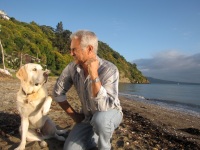How is it possible to be so sensitive to the suffering of Jews during the Holocaust and indifferent to animal suffering? This is the question that kept coming up for me when I read Claude Lanzmann’s memoir: The Patagonian Hare. I had seen his film Shoah, all 9 hours of it, and was impressed. Here was someone who knew about pain and the taking of life for no reason. I liked the way he titled his book, after seeing a solitary hare when he was in Patagonia and realizing how this wild animal stood for freedom from constraint. It seemed to me he was poised to understand in some depth what it mean to deprive an animal, any animal of his or her cherished freedom. So I was deeply disappointed when right at the beginning of his book he goes out of his way to say butchers “practice the most noble of professions and are the least barbarous of men.” Why, I wondered, would he think this of people who kill animals for a living?
Then, a bit later in the book, when he describes his childhood on his grandfather’s farm, he writes, “I would not have missed seeing him executing rabbits [!], wringing the necks of chickens, beheading ducks with an axe on a block of wood, for anything in the world.” This is more than a bit creepy; most children who have witnessed the merciless killing of a helpless rabbit, duck, or chicken, are horrified, and often cannot get the ugly image out of their mind. I know because when I was 9 a neighbor tricked me into watching him laughingly behead a chicken, an image I still find terrifying to remember.
A few pages on Lanzmann recalls a beloved teacher, Ferdinand Alquie, and assures us that “to the end of my days I will remember the way in which, during one of his lessons on sexual perversion, opening and closing his incredibly expressive fingers, he married the gesture of strangling a pigeon with the word jouir. [to have an orgasm], which he rolled around his tongue, drawing out the sound.” He was describing a woman who could only reach orgasm by strangling a dove. “I adored him,” he assures us, “we all did.”
How French, a small blind spot, you might object. But then how come he and his lover, Simone de Beauvoir (who certainly understood something of how women have been made to suffer over the ages), made a point of visiting Franco’s Spain where Lanzmann “with enthusiasm and a willingness to learn, embraced her passion for bullfighting and corridas?” A book he loved deeply was written by a French friend, called, ominously, The Ears and the Tail, praising the virtues of bullfighting.
All of this raises a very troubling question: How come it is so easy to see no connection whatsoever between human pain and suffering and animal pain and suffering? Is the us/them distinction so deeply etched into our species DNA that it requires a mighty effort to free ourselves from its dark spell? Lanzmann spent 9 hours lamenting the fact that the Nazis were able to see Jews as completely distinct from other Germans, as sub-human. This is what enabled them to kill them without mercy, without, evidently, thinking they were killing people at all, people who clung to their lives as much as any other person. Is this not true for all animals we kill? They too want to live. They too have inner lives, family, friendships, thoughts, feelings. They suffer as much, if not more, than we do. How come this thought never once occurred to Claude Lanzmann, and how come, too, I have not seen a single review (almost all of them ecstatic in their praise of this dubious book) raise this issue? It is hardly irrelevant to his theme.
And, to close, let me point out that it is not just animals who escape Claude Lanzmann’s vaunted compassion. A member of our own species is the completely baffling, and, yes, horrifying, object of his contempt merely for being born with disabilities. He is describing visiting a Polish farmer near Treblinka and is repelled by the smell of sour milk and cabbage in the home, “but what was most frightening was the monster, his son, paralysed, mentally handicapped, wracked by uncontrollable spasms in his chair, head always turned to one side, tongue hanging out.” I had to read this several times to make sure I had not missed something. What on earth does Lanzmann believe this poor child had done to make the visiting Frenchman describe him with such heartless contempt? How did not some editor point out that in the 21st century, civilized people do not call a blameless person with disabilities “a monster?” The passage is, excuse the expression, simply monstrous and should never have been written. It makes me believe that Lanzmann is not just blind to animal suffering, but that of other humans he, for whatever reason, does not believe are part of the human species. Where did we see this before?



You pose questions, and one is at a loss how to go beyond asking questions, without descending into mere abuse.
Humans have a lot to learn, but sadly their monkey-tricks have unleashed such forces that before they learn they will destroy the basis of their lives, if they don’t first destroy each other in nuclear wars in struggle for diminishing natural resources
Comes to mind the character Chauncey Gardener in the movie Being There. Why do we believe that this sociopath has insight worthy of our interest.
Say it ain’t so, Simone.